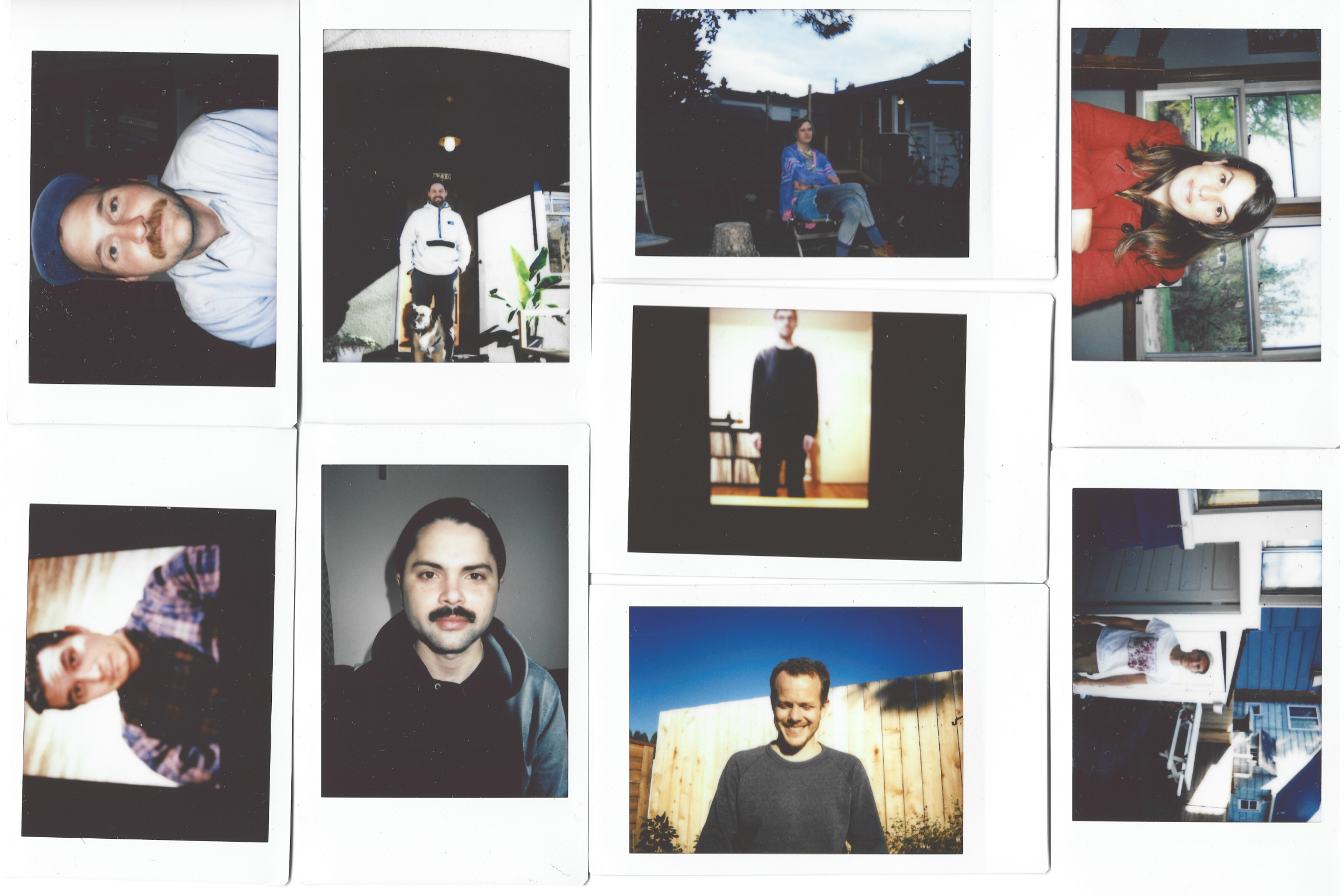Kyle Morton’s rock band Typhoon is famously large.
With roughly eight permanent members and a live lineup that’s been known to swell to well over a dozen, performing or simply even practicing has been nearly impossible during the pandemic.
“If we got all of Typhoon together, I think it would qualify as a super spreader event,” Morton quipped during this interview with OPB.
While it’s darkly funny, that joke is laced with a healthy dose of apprehension from the Portland-based songwriter.
As lockdowns were instituted last year, Morton began writing what would become the band’s fifth album, “Sympathetic Magic.” The subject matter came quickly, resulting in surprisingly topical lyrics that explore current events and familiar themes from recent months. But when it came to recording, the band faced challenges that forced them to embrace a more stripped down version of their trademark orchestral sound.

'Sympathetic Magic' by Typhoon
Typhoon
“Sympathetic Magic” doesn’t suffer from that pullback. If anything, it accentuates the record’s big swoons of emotion. It’s a beautiful and brooding album for our times, filled with intense themes, conflicting feelings, incredible highs and crushing lows. Protests, alienation, isolation, grievance politics, drifting friendships, conspiracy theorists, and even the apocalypse make appearances during the twelve songs. But through it all, Morton clings to one thing we all desperately need right now: hope.
The Typhoon bandleader joined OPB to chat about that new album, how nearly a dozen people succeeded in recording songs while still adhering to social distancing guidelines and the Amtrak train ride that inspired the album’s lead single.
Jerad Walker: I’m here with Kyle Morton, singer and bandleader of the sprawling indie rock outfit Typhoon. Thank you so much for taking the time out of your day to hang out with us.
Kyle Morton: Thank you so much for having me. I really appreciate it.
JW: Typhoon just released their fifth album, “Sympathetic Magic,” via Roll Call Records. This was a total surprise. Was there a sense of urgency in getting the music out there?
KM: Yeah. I wrote a lot of the songs just in the past year, most of them just last summer. And while they kind of stay away from polemic or anything like that, they do feel very much of the moment. The idea of releasing this record that was, in part, about the November election and then part about the protests over the summer and the COVID shutdowns— if we released it in 2022 when everything’s more or less so-called normal, I don’t know that it would work. So it felt like we had to get it out now.
JW: It seems like your timing was perfect here, especially with a song like “Empire Builder.” I first heard that maybe two weeks after the storming of the U.S. Capitol and it literally gave me goosebumps.
KM: That’s kind of you. Although I wish the circumstances were different. I think most of us do.
JW: The opening lyric is just an incredible piece of imagery:
The apocalypse is incoming / Only moving slow and unevenly / The empire builder returning east / Like the rising blade of the guillotine
KM: I started writing that song, or at least I got the idea for that song, many years ago. I was riding the Empire Builder, the Amtrak train. That was the original thought I had when I first took this train. [There] was this thought that stuck with me, which is that in pop culture we all kind of imagine the apocalypse is going to be this big bang and then everyone feels it concurrently. But I started having this idea that the apocalypse was really going to be these little malignant pockets that start radiating outwards and you don’t even really notice it at first until they’ve kind of converged. This idea that it’s not going to be this universally felt experience. It’s going be this locally felt thing that then kind of metastasizes, which is a line that comes up later [in the song].
JW: As dark as the song is though, it ends on a really hopeful note, which is something you don’t always do. Why?
KM: Yeah [Laughter]
It felt like the kind of sentiment we need right now. To me, I’m singing something that’s clear eyed enough about its own optimism. But that’s kind of the big Greek chorus to this conversation from the train, which is that alienation is run amok right now and everybody feels alienated. I mean, COVID has been a magnifier of that, because everyone’s stuck at home and living their lives through their computer screens. A lot of people are, anyway. That’s enough to make somebody angry. That’s enough to make somebody lonely. These are, paradoxically, universally felt experiences right now. And so you know the last line— “Maybe love is not enough / But let’s not rule out the possibility”— I just felt like it was important to invoke that.
JW: Throughout the years, you’ve said publicly many times that the writing process for Typhoon is difficult and a little messy. And the last time OPB chatted with you, I believe you called the band a “sadomasochistic commune.” That’s a quote. [ Laughter]
KM: Oh yeah! I remember. [Laughter]
I think that was the first time I said that in any kind of press, but it kind of stuck.
JW: Was this album different?
KW: Ironically, it has a song called “Masochist Ball.” But this was, at least for me, the least masochistic record we’ve made. I mean, one, there was no pressure. Like nobody was really expecting us to make a record right now. I didn’t even tell our record label I was working on it. I didn’t tell our band. Actually, I recorded the whole thing in demos.
JW: Surprise! [Laughter]
KM: Exactly. And then I sent it to them in an email. So it was a weird way to do a Typhoon record because we’re generally much more in touch. But, you know, again, COVID.
JW: Were they excited to see it? Because I think everyone has a lot of downtime or has been managing a lot of stress.
KM: Yeah. You know, I hope some day we can all really sit down and unpack what it’s meant to make this record because we haven’t had that. A couple of folks have come over to my house, and I’ve recorded their parts. So Alex [Fitch] did all the drums here…
JW: Yeah, how did you functionally record the album?
KM: It was really a patchwork. Some of it was pretty legitly recorded in my basement with this nice mic and a couple other mediocre mics. And then, Eric [Stipe] the trumpet player recorded his parts on GarageBand in his house. Devin Gallagher, he’s kind of our percussion wizard, he did all of his parts in his house. Our paths never crossed. It was very much a correspondence-based recording process.
JW: The band is famously large, sometimes consisting of 10 or 11 members live. I think now you’ve trimmed it down to 8. But that sometimes balloons back up to an even bigger number than either of those configurations.
[Laughter]
KM: Yeah.
JW: I feel like the project has always been at its most powerful when you use the full band almost like an orchestra. It’s far more subtle on this album than some of your other efforts. And I think that minimalist approach really is effective here, especially on a song like “Evil Vibes.”
KM: “Evil Vibes” was one of the first songs I wrote during the quarantine. For anyone who’s heard it, it’s kind of an acousticy-singer-songwritery type song and then kind of out of nowhere, at the very end, there’s this very intense, almost Hans Zimmer orchestral bit that comes in.
But to go back to what you just said, in Typhoon generally— I’ve spent a lot of time with Shannon [Steele] and Eric [Stipe] and some of the other members belaboring arrangements for horn and string arrangements or percussion arrangements and really trying to tightly arrange. And I think I have fun with that. But it also seems-- sometimes it feels like you get lost in the math.
So with this, I really wanted it to be as effortless as possible. I kept thinking of that Leonard Cohen song, “A Thousand Kisses Deep,” where he says, “Slipping into your masterpiece.” I kept thinking that maybe there’s a way to make something I really like without trying too hard. It’s a slightly slacker ethos I’m putting forth here. But that was kind of how we approached the arrangements and recording it. We knew we couldn’t get in the studio or rent a space and all get together and arrange and play the songs. So I kind of felt like we should just try to do less is more.
JW: What’s something you’re looking forward to in the next year or so as things change, hopefully?
KM: That’s such an important question to ask these days, like just keeping something on the horizon so that life can have any meaning. So thanks for asking it.
Right now we’re just excited to play these songs together someday. We haven’t done that. I’ve played them with our drummer, and that’s about as close as we’ve gotten. So I know we’re all excited about that day when we’re all vaccinated and can get in a room and play these tunes. We’re looking at how to do that safely now. But-- I wrote something like this in a blurb about this record— if we got all of Typhoon together, I think it would qualify as a super spreader event.
[Laughter]
So I want to be prudent about it. That’s what we’re looking forward to. We’re talking about doing some touring in 2022 if that’s even in the cards. But just playing music with my friends would do a lot of good for me right now.

